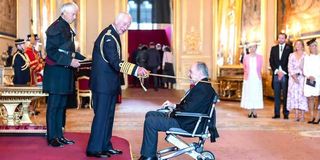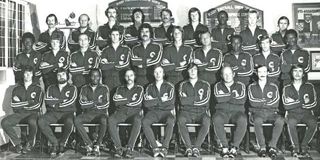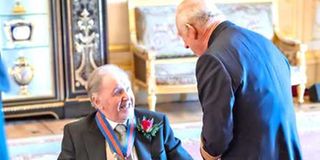Premium
Sir Richard Evans: A selfless champion of rugby

Richard "Dickie" Evans being bestowed the The Order of St Michael and St George at the Windsor Castle by King Charles III on July 10, 2024.
What was Richard "Dickie" Evans initial reaction when he was first informed that he would be recognised by the Monarch of the United Kingdom for his worldly contribution to business, sports and charity in Kenya and the UK.
Disbelief. In his own words, the former Kenya Simbas, Uganda Cranes, East Africa Tusker, Kampala RFC, Scorpions RFC and Nondescripts RFC player, no doubt enlightened by his travels, battles and conquests simply said: "Very strange. I was informed by the High Commission of UK in Nairobi on December 1. I told my wife and she did not believe me. Then around Christmas the communication came in writing. I was going to be knighted. I did not believe it! It was one of the top three accolades you can get. It was fantastic news. I did not know what to do."
On July 10, at the age of 78, Evans was indeed bestowed The Order of St Michael and St George at the magnificent Windsor Castle in Windsor, England for his contributions to business, sports and charity.
A knighthood is a title given to a male citizen of the United Kingdom or the Commonwealth by the King for achievements or service to the country.
Evans' history in sports, and in particular rugby, makes him a worthy recipient.
The former international utility back who could play stand-off, centre and wing, first came to East Africa in 1969, settling in Uganda as a civil engineer on a World Bank project before relocating to Kenya in 1971 and has been a strong supporter of local rugby since then.

1975 East Africa Tuskers team photo
In 1993 he was instrumental in getting England-based David Protherough to help build the national team. He also helped bring British coach Stuart Urquhart to Kenya to work as the Kenya Rugby Union Development Manager between 1996 and 2001.
Evans was the owner of a pro rugby team Newlance Penzance and Pirates for many years. The team was renamed Cornish Pirates RFC in 2005. What many Kenyans may not know is Evans was instrumental in former Kenya internationals then Benjamin Ayimba (the late) and Oscar Osir, then playing for Nondescripts, securing professional deals with the Cornwall side in 2004.
As recently as 2022 Evans led in fundraising for the Kenya Simbas to prepare and travel for the 2023 Rugby World Cup qualifiers in Dubai. He paid the players' allowances from his own pocket amounting to about Sh1.8 million when they threatened to boycott the qualifiers.
Evans first played rugby for Penzance and Newlyn RFC, Richmond FC and Cornwall before relocating to Uganda in 1969 as a civil engineer on a World Bank project. ‘I was a member of the Kampala side which entered the 1971 Kenya Cup but we lost two members of the team to Idi Amin’s regime. I then relocated to Kenya where I first represented Mombasa before eventually ending up at Nondescripts,” said Evan in a 2019 interview. It was during his time at Mombasa that he was first called up to Kenya and skippered the Simbas against Tanzania on July 9, 1972 in Arusha.
“Dickie” Evans was an integral member of the Nondescripts side that won the 1975 Enterprise Cup, the beginning of a 10-year trot. ‘It was blood on the pitch’ interjected Peter Giraudo, rugby journalist of the 1970s.Lenana School wonder boys Jackson Omaido and Walter Omaido were supposed to start for Nondescripts where they were paired at centre but they did not show up and were replaced by the reserves David Evans and Martin Watson. That forced Nondescripts to shuffle their starting 15 with Ken Chambers and Martin Watson paired at centre while Dave Evans started at fly half with Dickie Evans at scrum half. Nondescripts finally ended Impala’s four-year domination with a last-minute goal that gave them a 30-28 victory.

The King of the United Kingdom, King Charles III confers with Richard "Dickie" Evans at Windsor Castler in Windsor, England on July 10, 2024.
His association with Nondies is special. "I put in a lot of money in Kenyan rugby for Nondies, for Kenya Harlequins," he confesses.
Dickie was Nondescripts club captain in 1976 when the white shirts won the Enterprise and Nairobi District Championship. On August 19, of that year he led Nondies to one of their finest hour as they defeated touring Zambia 19-8, the only local team to do so after Kenya, Scorpions and East Africa all lost.
He led the The white shirts toured Eastern Canada in September 1976 successfully winning five games in seven days. They only lost one match on tour. Nondies won the Montreal Sevens to give a glimpse of Kenya’s potential in the abbreviated version of the game. Evans subsequently won his Nondescripts honour’s cap that same year.
Although he suffered a major injury scoring a try for Nondescripts in the 1976 Enterprise Cup final he still came back and led the Nondescripts A to the 1981 Eric Shirley Shield title.
Nondescripts named their museum “Dickie Evans” in his honour when they marked their 100th anniversary last year.
Just like faith, they say, for those who love rugby, no explanation is necessary and for those who do not love rugby, no explanation is possible.
But why does Evans keep supporting the game and without seeking publicity for his deeds?
"Rugby is like a fraternity of people around the world. Kenyan does not get help from the government and other people. There are some great people out there. I just like to help people out. People like Paul Odera (rugby coach) who have done a lot with Kenya Simbas. It's good supporting them and the game. Rugby is big in Kenya. The government needs to support it. Sevens is doing well, the 15s game can as well. But it needs support," he says.
Odera aka Paul O, who accompanied Evans to England for the ceremony, gives testimony about the great rugby benefactor.
“He once gave us kit worth $40,000 when the union had no money,” says the World Rugby Level III coach who handled Kenya Simbas from 2019 to 2023
“Dickie really liked me and how I was coaching the team. He wanted to see us qualify for the World Cup and I would sometimes personally call him when we got stranded because of lack of funds,” said Odera known for his detail to processes and systems.
It helps to be well off.
Evans was the founder and Chief Executive of giant horticulture company Homegrown for 25 years. He is currently the chairman and majority shareholder of Hemingways Hospitality Group.
He has also helped the government in various senior capacities. Notably, Evans was part of the 20-member Presidential Commission charged with developing Kenya's Vision 2030.
He was voted one of the top ten Most Respected CEOs in East Africa in 2004 in a Price Waterhouse managed award.
"The king said 'Keep up the good work. He is a very nice guy." Evans said of his meeting with the British Monarch.
Did he tell the King about his nickname “Dickie”?
Not really.
So what about that name?
“I used to sidestep. I was quite fast like a dik dik (antelope),” he says.
His contemporaries back up his talk.
“Dickie was one of the leading fly halves of the 1970s and would finish a game with his kit in sparkling condition, despite being involved in heavy action. He was a superb handler of the ball and the most precise kicker you could ever wish to see,” said Peter Giraudo, rugby pundit of the 1970s and 1980s.
"Evans was left footed and could step off both feet. He was unerring when going for touch, and had a longer range for touch and drop goals. From full-back he had a devastating left foot,” recalled his 1975 and 1976 Nondescripts teammate Tom Oketch
Evans is now semi-retired and spends most of his time in Watamu, Nairobi and England.
He still harbours dreams of Kenyan rugby excelling at the highest level.
Says Sir Richard Evans, KCMG (Knight Commanders in the Order of St Michael and St George): “The game is not professional in Kenya. We need to have Kenya in the World Cup. To do that, we have to get a group of professional players now. A group of 40 or so players playing rugby regularly around the world. Get them playing rugby regularly in other parts of the world, playing professionally. We should get Kenya up there. With proper training they can get there."






